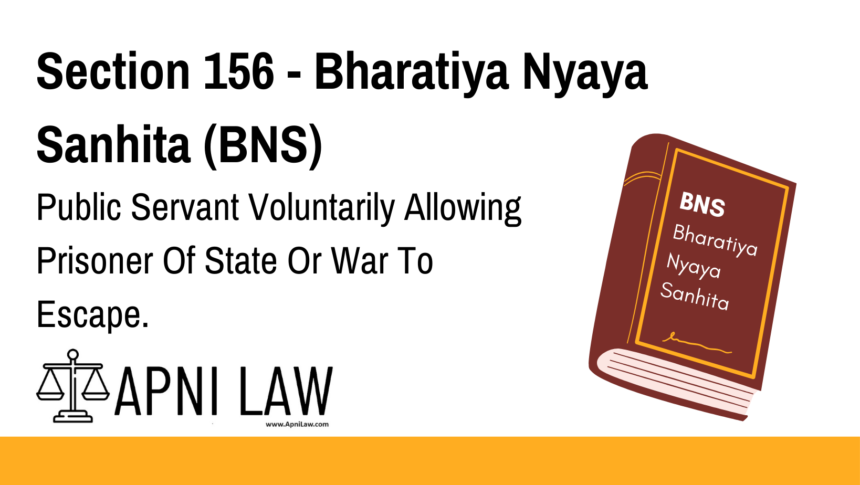Code – Section 156 BNS
Whoever, being a public servant and having the custody of any State prisoner or
prisoner of war, voluntarily allows such prisoner to escape from any place in which such
prisoner is confined, shall be punished with imprisonment for life, or imprisonment of either
description for a term which may extend to ten years, and shall also be liable to fine.
Explanation of Section 156 BNS
Section 156 BNS criminalizes the intentional act of a public servant allowing a State prisoner or prisoner of war to escape from custody.
Key Elements of Section 156 BNS
- The accused must be a public servant
- The section applies to jailers, police officers, military personnel, or any government employee responsible for prisoner custody.
- The prisoner must be a State prisoner or a prisoner of war
- State Prisoner: A person detained for crimes against the State, such as treason or sedition.
- Prisoner of War (PoW): A captured combatant from an enemy force during wartime.
- Voluntary Escape
- The public servant must have knowingly and willfully allowed the prisoner to escape.
- Negligence is not enough—it must be an intentional act.
- Punishment
- Imprisonment for life, or
- Imprisonment up to 10 years.
- Fine (amount at court’s discretion).
Illustrations of Section 156 BNS
Example 1: Bribery-Induced Escape
A jail officer accepts a bribe from a prisoner of war and allows him to flee. Since the officer willingly facilitated the escape, he is guilty under Section 156 BNS.
Example 2: A Guard Unlocking the Prison Cell
A high-ranking official, sympathetic to a political prisoner, intentionally unlocks the prison door, allowing the prisoner to escape. This is a direct violation of Section 156 BNS.
Example 3: Fake Transfer Order
A public servant forges transfer documents to release a State prisoner to the wrong authority, leading to the prisoner’s escape. Since this is a deliberate act, the official is liable under Section 156 BNS.
Example 4: Military Officer Helping a Prisoner of War Escape
A military officer helps an enemy combatant detained during wartime to escape from a high-security facility. This act is punishable under Section 156 BNS.
Common Questions and Answers on Section 156 BNS
1. Who is considered a “State prisoner” under this section?
A State prisoner is someone detained for crimes against the sovereignty of India, such as:
- Treason (Section 150 BNS).
- Sedition (Section 152 BNS).
- Terrorism or separatist activities.
2. What is the punishment under Section 156 BNS?
- Imprisonment for life, OR
- Imprisonment up to 10 years, AND
- Fine.
3. Does this law apply if the public servant negligently allows an escape?
No. Section 156 BNS only applies if the escape is voluntary. If the escape happened due to negligence or carelessness, a different section may apply.
4. Can a police officer claim ignorance as a defense?
Not if there is evidence of intent. If the officer deliberately allowed the prisoner to flee, they will be held liable.
5. How does this law differ from “Prisoner Escape Due to Negligence”?
- Section 156 BNS: Covers intentional escape of a prisoner by a public servant.
- Other laws (e.g., general escape laws) cover cases where a prisoner escapes due to negligence.
Conclusion
Section 156 BNS ensures that public servants responsible for prisoners do not abuse their power by facilitating escapes. The law imposes strict punishment (up to life imprisonment) to prevent corruption, bribery, or political bias from interfering with justice.
For more legal insights, visit ApniLaw today! 🚀








